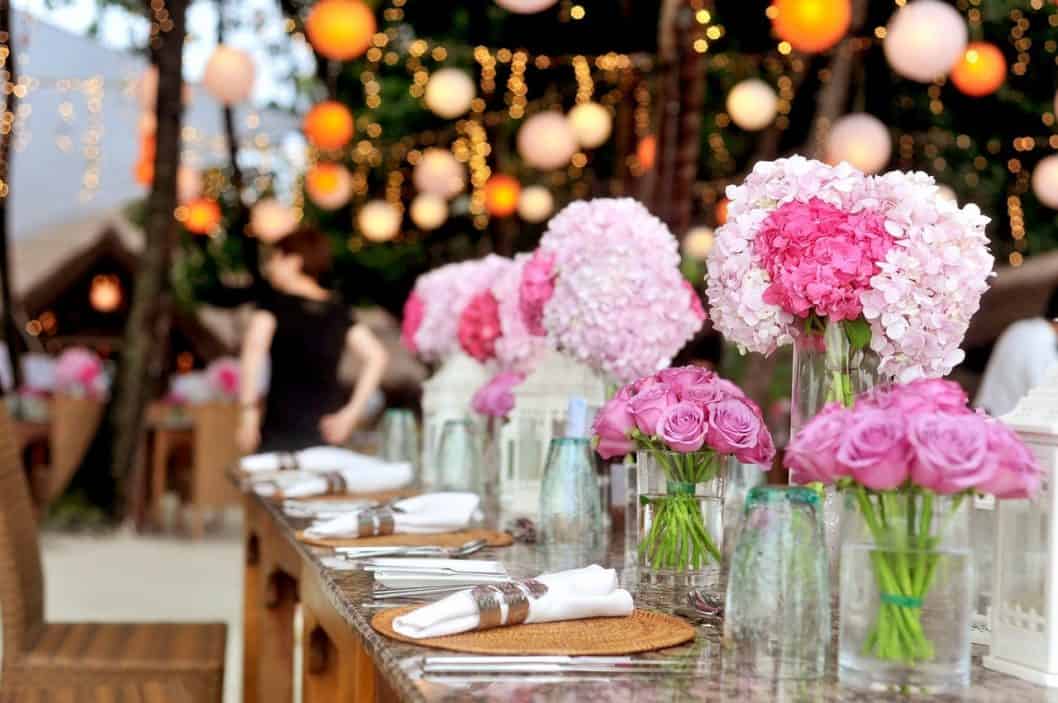Remember the last wedding you attended? If you’re a romantic type, you might describe it as beautiful, magical, or surreal. Even if you aren’t, weddings should have a smooth and practiced feel, with all the pieces falling perfectly into place. Behind the veneer of lights, dresses, and champagne is a wedding planner who has been working for weeks, if not months, to make this day go off without a hitch.
The flowers, the caterers, the outfits, the venue—every detail in a wedding is the responsibility of this hero behind the scenes, down to making sure the toilet paper is stocked. A good wedding planner addresses all the little details, makes sure no part of the wedding is overlooked and will put in the hours necessary to ensure a perfect and memorable day.
If you believe you have what it takes to be a wedding planner and want to know more about this profession, stick around as we give you the rundown on the job duties, salary, and what it takes to become one.
Wedding Planner: Job Description
A wedding planner is a specific event planner that deals entirely with nuptial celebrations. Generic event planners have many of the same responsibilities and deal with a variety of celebrations whereas wedding planners specialize in the many unique and nuanced aspects of a wedding.
Before the Wedding

Nearly all the work that goes into planning a wedding takes place far in advance. Clients will hire a wedding planner perhaps months in advance to help find venues and send invitations. The responsibilities of the planner vary from client to client. Some couples will elect to pass off nearly all responsibility to a planner while others delegate specifics they would like the planner to handle. The wedding planner can be expected to fulfill many of the following tasks:
- Finding and securing a venue
- Hiring staff, vendors, and other personnel
- Helping plan guest lists
- Sending out invitations
- Negotiating rates with various merchants
- Helping select outfits
- Overseeing set-up and decorations
- Scheduling and overseeing rehearsals
- Liaising with anyone involved with the wedding
- Budgeting the wedding
This list is not definitive. Clients will often keep some of these tasks and will assuredly come up with additional tasks they would like taken care of. Many wedding planners have years of experience, and as they build confidence in their abilities, they can offer more services and advice.
Veteran planners become more of a mentor and intuitive resource for the couple, knowing what has worked and what hasn’t in past weddings. Some clients may trust their planner with more personal decisions, deferring to their expertise in choosing dinner options, table settings, or music—things they may not have intended to seek advice on originally.
During the Wedding

The day of the wedding, a planner is constantly on alert, making sure any hiccups that arise are fixed quickly. They are responsible for delegating duties to the many people involved in the wedding, ensuring bathrooms are functioning and waste disposal is sufficient, and coordinating musicians, videographers, and photographers throughout the proceedings.
A good wedding planner knows of any area where something could go wrong and is prepared with a contingency. He or she is also the last word on many decisions that need to be made quickly and must bear responsibility for how those decisions play out. With good planning, a wedding should feel natural and progress smoothly, but it is the wedding planner who bears the burden of the chaos and keeping it out of sight.
Education and Skills
There are a few different routes to choose when becoming a wedding planner. Many weddings are planned informally without the use of a professional planner, so the requirements to be one are not fixed and vary wildly. More necessary than any formal education is the skill set necessary to plan a large and multifaceted event.
Degrees and Certificates
It is unnecessary to have any formal training to begin work as a wedding planner. However, many established event planning services exist and to compete with or be hired into one of these companies, you may need training or formal education. Many wedding planner and other event planners/venue managers have degrees in fields related to the industry.

Image by Asad Photo Maldives via Pexels
Degrees in business, marketing, or management can be helpful. Not only does the job require that you be ready to handle price negotiation, hiring staff and vendors, and managing the budget for the wedding, planners are often self-employed and must manage their own finances and the many challenges of running a small business. Similarly, hospitality and hotel management degrees can be useful as there is much overlap in the planning process and customer service.
With the rise in popularity of large wedding events, there are now certification programs for wedding planners. Many colleges and university extensions offer programs that teach the many sides of wedding planning. Students can expect to learn the basics of wedding structure and scheduling, bookkeeping, and customer service skills. These can provide much-needed information and build skills necessary to the profession as well as help with marketing oneself to prospective employers or clients.
Skills and Abilities
More important than any degree is the skill set and temperament needed for managing a wedding. Many planners have no degree and go into the service alone, building up their competency and reputation as they go. Others will work for another planner; either as an employee in a larger company or as an apprentice to another wedding planner. Regardless of the path, there are certain skills needed in the field:

Image by Kaboompics .com via Pexels
- Ability to adapt to challenges and deadlines
- Ability to work well in fast-paced and high-pressure situations
- Strong communication skills, written and verbal
- Leadership ability, coordinating many moving parts
- Scheduling and time-management skills
- Interpersonal skills, understanding the desires of clients
- Confident in negotiating and pricing for services
- Extremely detail-oriented
- Event-management experience
- Able to foresee potential problems
- Problem-solving and improvisational skills under duress
- Conversant with latest pricing/trends/etiquette in the wedding market
Many of these things cannot be taught in a classroom environment which is why there is no one educational path to becoming a wedding planner. Many planners start as servers, restaurant managers, or hospitality workers. The best planners are those with a proven track record, who have experience with the inner workings of the service industry, the food industry, the flower industry, etc.
Weddings are the intersection of so many disparate businesses, professionals, musicians, and cultures, that it takes someone with an ability to learn, understand, and adapt. These qualities are more valuable in the wedding planning profession than memorization of facts.

Image by Asad Photo Maldives via Pexels
It is also useful to have a good eye for beauty and decorating skills. Not all planners involve themselves heavily in the aesthetic process of the wedding. They may defer to decorators and contractors whom they trust to make decisions. However, there are several aspects to a wedding that require an eye for aesthetics (invitations, table settings, clothing, etc.), and it is difficult to coordinate a wedding without one.
Salary
Compensation depends on each wedding planner’s business model. Typically, the planner will receive a percentage of the cost of the wedding as opposed to a fixed rate or hourly wage. This percentage can change but is usually around 10%. With this model, a wedding planner must be diligent with their time, ready to work difficult hours, and accepting of any errors on their part (for which they won’t be compensated). The more skilled and efficient a wedding planner, the less stressful and more rewarding the job becomes.
The most well-known professionals in the wedding-planning industry can often command a high price tag. Celebrities and other wealthy clients will turn to those at the top of the industry, trusting them to provide a seamless and unique experience.
Factors Affecting Salary
There are a few factors that heavily impact the salary and job outlook for wedding planners, including season, locality, and social media.

Image by SplitShire via Pexels
First, weddings are seasonal events and most planners will be busy in the summer months while the winter months will bring scarcity. Most clients prefer not to schedule a wedding around the holidays as other spending and travel habits get in the way. Also, the winter months are colder and typically less predictable regarding weather. Those who plan weddings for a living need to be financially prepared for hills and valleys in terms of work and income.
Second, weddings are a large expense, made larger by hiring a planner. Wedding planners often struggle more in rural areas and areas with a lower average income. Weddings in rural areas also tend to have fewer guests and a smaller price tag in all regards, making it less lucrative for a planner.
The last factor to consider regarding salary is the role social media is playing in the wedding planning industry. With social media being such a popular avenue for advertisement, most bakeries, musicians, and venues are marketing directly to the public in ways they haven’t in the past. As a result, many couples are doing their own wedding planning.
Conclusion

Image by Terje Sollie via Pexels
To make a profession out of planning weddings, one must have a very diverse list of skills and qualifications in addition to possessing the traits of a business owner, decorator, manager, and friend. The bride and groom rely upon their planner to ensure that their special day is everything they envisioned. It comes with many pressures but also the joys of seeing hard work come to fruition.
Featured image by Natasha Fernandez via Pexels.

